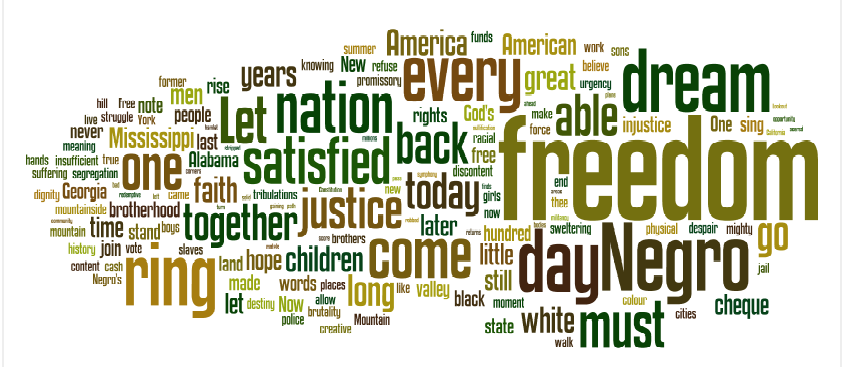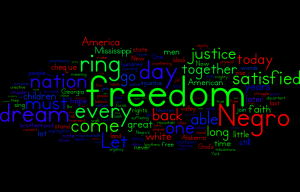
(Wordle of Martin Luther King’s “I have a Dream” speech)
There are many dominant words that significantly stand out in Dr. King’s speech. For example, there is freedom, Negro, dream, day, ring, nation, and every. However there are many subordinate words as well; there is racial, negro’s, Georgia, and colour.
Looking at Dr. King’s speech through textual analysis, in this case word frequency, allows for a better interpretation of his speech. Taking into consideration that the speech was written to motivate his followers to boycott, protest, and demonstrate until they were given equal rights and privileges like any other United States citizen, it would be evident that “freedom” is the most predominant word in his speech. For Dr. King, utilizing the word “freedom” in a copious manner allows for his listeners to understand his “call-to-action” and helps to re-emphasis his preeminent aspirations. Moreover, using words like “dream” and “nation” illustrate the idea of achieving his goals and the idea of becoming a whole country, where everyone has their rights.
On the other hand, the lack of words like “racial” and “negro’s” could be due to the fact that Dr. King did not want to point much attention on discrimination, but he wanted to look to the future and capture the “dream.” Additionally words such as “colour” and “Georgia” could have a negative connotation. Dr. King did not want to fill his followers with bad thoughts; however, he did want to motivate them towards creating racial equality.
Consequently, from this textual analysis we can see the psychological tactics and cleverness that Dr. King used throughout his speech.

(N-gram of MLKS’s most significant words in “I have a dream”)
This is one of the most impressive N-grams I have ever come across. It is clearly shown that between the years 1940 to about 1970, with the exception of one dip in the graph, the term “Negro” was used frequently. This would make complete sense because of the civil rights movement and events like “Brown vs The Board of Education.” However, in recent years the term “Negro” has dissipated throughout books. This is most likely because it is referred to as a “racial slur” and the negative connotation attached.
“nation” is more popular in texts during the early 19th century because the Constitution and Declaration of Independence had just been signed, and a new “nation” had just formed. Also, it is clear that “freedom” was not used much until about the 1940’s during World War 2.
The most interesting word for me is the progression of “dream”. In a world full of tragedy and despair, it seems that writers are becoming more optimistic. It’s like they are trying to tell the world that you should have hope and believe in tomorrow. In another sense, it could also be used more often because of technology and the material written uncovering new ground – “dreaming” what the power of technology could do.
Source Texts for MLK
During the upward trend and peak from about 1960 to 1970, there were many texts used with the word “Negro”. For example, Black World/Negro Digest, Funnyhouse of a Negro: A Play in One Act, and Black Metropolis: A Study of Negro Life in a Northern City.
For “nation” between 1880-1977, there are books like Redeemer Nation: The Idea of America’s Millennial Role and The Birth of the Nation: Jamestown, 1607.
Other Dominant Terms
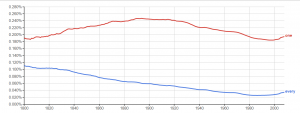
(N-gram of MLKS’s most significant words in “I have a dream”)
This N-gram represents a problematic issue with distant reading. While the word “one” has had high priority since 1800, it is not easy to distinguish in what context “one” is used. That is to say, “one” is a very common word, and many of the sources will have little to do with MLK’s speech. The same problem happens with “every” too.
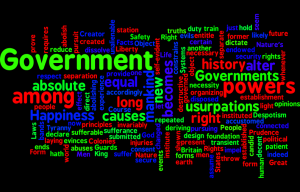
(Wordle of The Declaration of Independence)
The most dominant words in The Declaration of Independence are by far Government, powers, among, and happiness. Some subordinate terms are abuses, form, Creator, and Safety.
I think distant reading in this case shows the faults that were made while making the declaration. For example, it seems that words that would be more close related with independence are subordinate, like “equal” and “liberty”. It’s odd that there is more emphasis on government, in general, than the people.
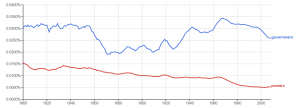
(N-gram of the two most popular words in The Declaration of Independence)
“government” had a high amount of usage in literary text in the early 19th century, most likely because of the forming of the United States. However after lacking in importance, it became relevant again throughout the 1920’s to the 1970’s. I would assume this is because of the presence of the government in WWII, the Vietnam War, the civil rights movement and many more. There were a plethora of issues during this time that the government had taken action. Once again, after the 1970’s the usage of “government” declined. This could possibly be because there were no major issues that the government was involved in after 1970, except for in 2001 when the World Trade Center was under attack – the N-gram shows a small peak at 2000-2001.
“powers” is another problematic word because the literary texts could refer to “super natural powers,” etc. instead of government or the people’s powers. In fact, it is unclear whether “powers” refers to the government or people when looking at the wordle.
Extra Credit
The prosodic elements that the author shows on the site illustrate the emotional state of the MLK, but also shows the form of the utterances (question, commands, statements, etc.). It also exemplifies the way in which MLK discusses his points using beautiful metaphors. It is almost as if he sets up a metaphorical framework to make his points.
The use of his metaphors adds a lot of hidden emotion and thought-provoking ideas. It uncovers a great deal of Dr. King’s intellectual process during his writing/thinking process.
He is a mastermind at forming conceptual ideas beautifully and transmitting them to his audience with extraordinary emotion.
